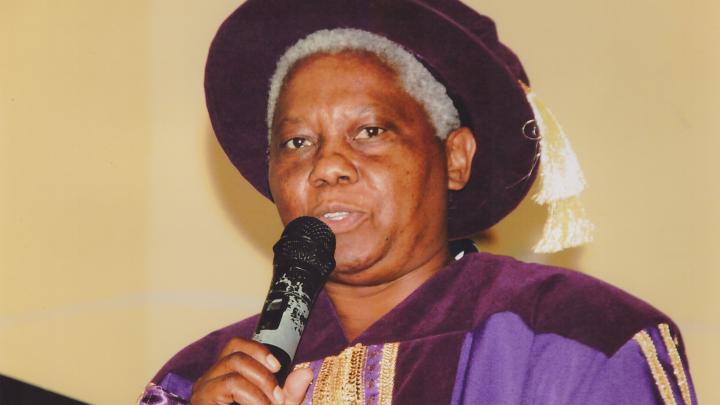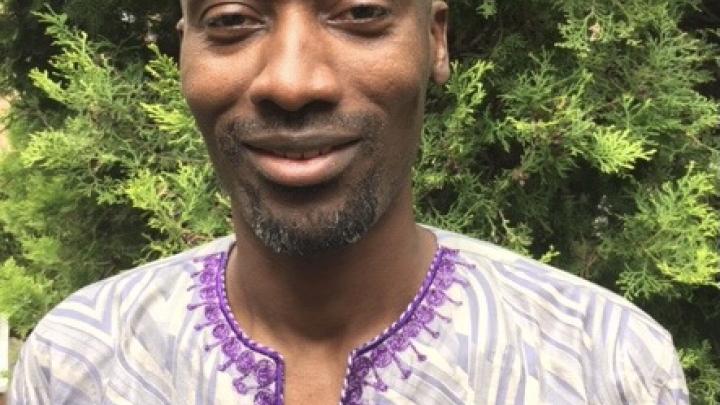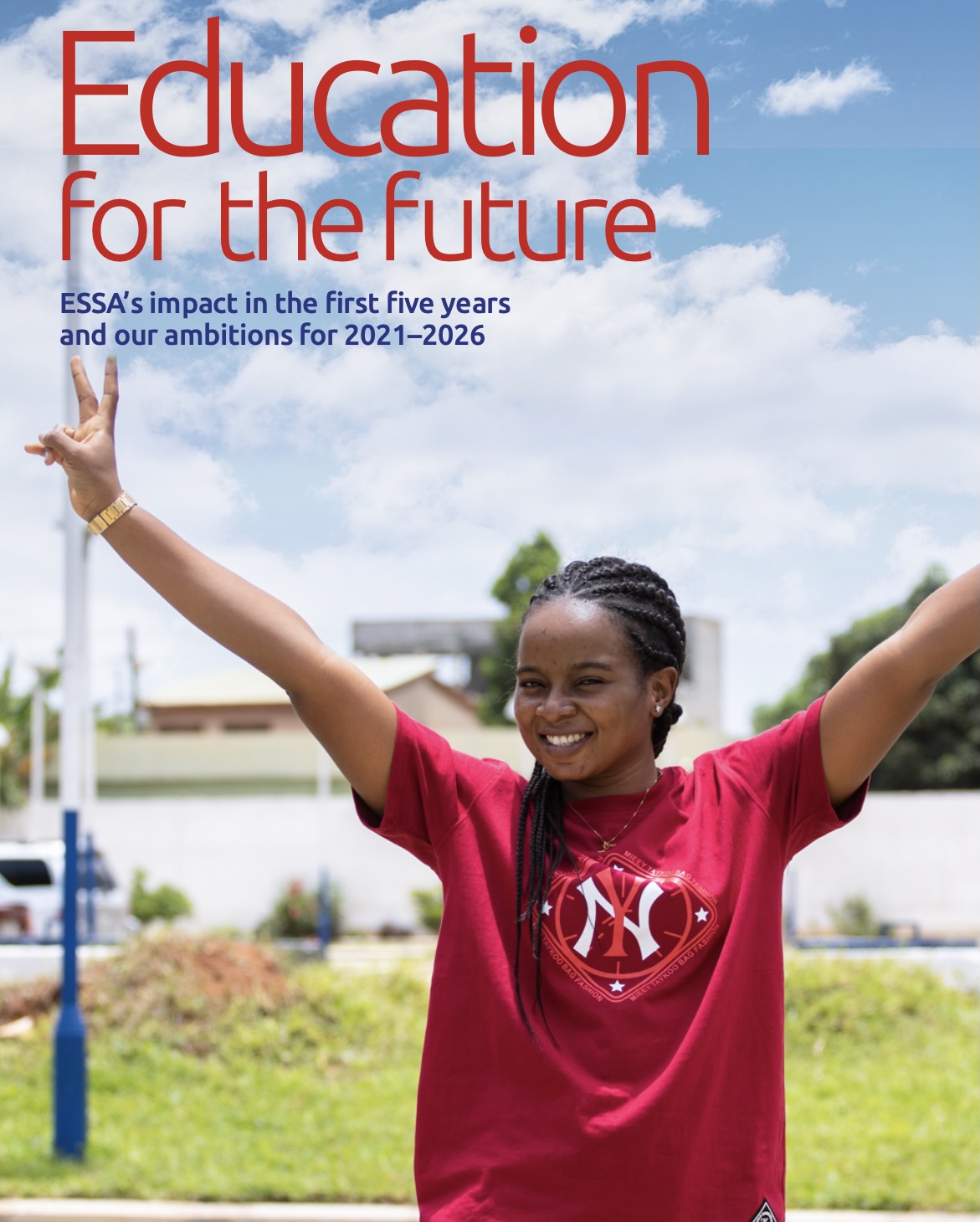
Welcome
We are proud to present ESSA’s 5th Anniversary Report, giving an overview of our contribution towards transforming tertiary education in sub-Saharan Africa from 2016 to 2021.-
We have always taken a step-by-step approach to improve post-secondary education in sub-Saharan Africa
I am proud to share the ESSA 5th Birthday Report, giving an overview of our achievements from inception five years ago and sharing our vision for the next five years.
Since the beginning, ESSA has always taken a step-by-step approach. As a start-up in 2016, our strategy was to establish ESSA as a charity, build a board and team, secure funding from influential partners, and deliver our model as quickly as possible. Our initial focus was on improving post-secondary education in sub-Saharan Africa by working on three big challenges: the visibility of African research on education, the faculty crisis, and the impact of university and college scholarships for young people. This was made possible by the early and flexible support of Robert Bosch Stiftung. An investment of one million Euros from the Foundation enabled us to make a meaningful contribution to improving education in sub-Saharan Africa.
In 2019, we entered a new phase, catalysed by the support of Dubai Cares and private donors we were able to grow the team and form new partnerships in order to create further impact. This investment enabled us to expand into tertiary education, and start work on two additional challenges: unlocking women leaders in education and young people’s transition from college or university into work.
Now in 2021, we operate a cost-effective approach with a 15-member distributed team based in Ghana, Kenya, Germany and the U.K. Since start-up, 33 students from across sub-Saharan Africa have taken part in our paid internship programme. Working alongside this passionate and committed team every day is the real privilege of this job.
So it is with a strong foundation that we can look forward with excitement to ESSA’s next five years. This ambitious strategy set out in this report is designed to support an evidence-led transformation of post-secondary education in sub-Saharan Africa. A transformation that has only become more urgent in the wake of the global pandemic, equipping young people with the skills for work is critical to a strong recovery.
Our goal is to support over 1.4 million students at more than 500 universities and colleges in Ghana, Kenya, Uganda and Zambia to achieve their ambitions and create more opportunity for the millions that will follow. We will do this by working across the student journey: from accessing education through to transition into employment. ESSA works at the systems level and a strong knowledge ecosystem is critical to any sustainable, systemic change. Therefore we remain committed to building the visibility of African education researchers and increasing access to evidence and data.
We have all learned in the over the past year how big, unexpected events can up-end the best-laid plans. While we cannot see what is coming in the future we know we must remain nimble and responsive to the changing needs of our partners. Our guide in this, as ever, is our commitment to our values. We are evidence-driven, solutions-focused, always learning and strengthening trust in our operations.
A special thank you to our investors and partners. Your trust, collaboration, and shared vision to transform education for young people in sub-Saharan Africa is reflected in our successes.
I would also like to thank our ESSA Board of Trustees, led from South Africa, Kenya, and Europe, and my team for their continued commitment to our work despite an unprecedented past year. I would like to pay particular thanks to Dr Olaf Hahn, ESSA’s former CEO.
I very much hope you enjoy reading about our journey so far and are as excited as I am by where we plan to go next.
Lucy Heady
Chief Executive Officer and Chair, ESSA
-
I know the importance of scholarships in helping more young people access universities and colleges
We are living in extraordinary times and as the pandemic has changed major parts of our lives. This generation of young people are sometimes labelled as not having the leadership skills to be at the centre of decision-making.
However, recent times have proven we can do anything. I am so proud of the hard work of young people in Africa in responding to pandemic and other huge challenges we are facing like unemployment. From becoming creative entrepreneurs in Ghana to working as frontline workers fighting the pandemic in Zimbabwe, we have been resilient. This can also be attributed to the education, trainings, mentorship and opportunities provided by institutions and individuals to build our leadership skills. One of such organizations is Education Sub Saharan Africa and I have had the opportunity to intern with them.
I got to know about ESSA in May of 2017 when my university notified students of a summer internship opportunity working on a research project for ESSA. My application was successful, and I began my two-month internship in July as part of the team that mapped university scholarship programmes in sub-Saharan Africa. This led to later creating and launching a website called the African Scholarships Hub where students can find the right scholarships for them. I enjoyed working on the project as I found out about different scholarship programmes available for African students to pursue higher education. While I was in Zimbabwe, I only knew of a handful of these programmes, and I realized that many students may miss out on opportunities simply because they do not know that these programmes exist. As an August Wilhelm von Hofmann scholarship recipient, I know the importance of scholarships in helping more young people access universities and colleges.
My internship led on to working as a Research and Programmes Intern for ESSA since October 2017. Since then, I have had insight into the challenges facing university and college education in sub-Saharan Africa such as quality, accessibility, inclusiveness and equality, as well as the numerous efforts by various parties to solve these issues.
As ESSA celebrates its 5th anniversary this year, I reflect on my contributions as a young person in this organization and how we can all support a charity that works with and for young people. The end goal is to ensure that young people in sub-Saharan Africa have opportunities and resources to help achieve our ambitions.
Lisa Tichagwa
Intern, ESSA
"The seed-funding provided by us is offering high return on investment. I am excited to see ESSA growing further, and to produce high impact for Tertiary Education in sub-Saharan Africa.”
Joachim Rogall, President and CEO, Robert Bosch Stiftung, ESSA Trustee
Stories
Ruth Mubanga, University Vice Chancellor in Zambia, Rita Asantewaa Opoku, a student at UPSA on a scholarship, Samuel Asare, Research Manager at ESSA, and Rose Dodd, The Director of The Education Collaborative in Ashesi University tell their stories about social inclusion and the tertiary education system in sub-Saharan Africa.
“We believe this partnership will help connect millions of students and graduates to employment opportunities and will be central to developing successful and sustainable economies and societies."
Dr. Tariq Al Gurg, Chief Executive Officer, Dubai Cares
Our Strategy
Sub-Saharan Africa is already home to the world’s largest youth population. By 2050, this population will increase by 50%. This generation can drive the future of our world. To unlock this potential, young people must have access to the right education and skills to find and create work.-
The power of universities and colleges to transform Africa’s future
-
Quality education and jobs for the world’s largest youth population could lift millions from poverty and strengthen societies globally. Without these opportunities, the world faces the risk of migration and unrest.
-
Colleges, universities, and vocational courses build young people’s skills for work and prepare them to be active citizens in their communities.
-
These institutions are the training ground for professionals, including teachers, education staff, and vital health workers.
-
Colleges and universities are hubs for knowledge, driving evidence and solutions for transforming society.
-
-
-
Filling the knowledge gap
There are big gaps in data and evidence about the relevance of university and college for work.
For example, we do not know the most cost-effective ways to support more young people going to university or college, or helping young people with their next step when they leave education.
This leads to low, badly targeted investment.
-
Building an evidence alliance for education
We support university and college leaders, employers, policymakers, and young people to turn evidence into practical solutions and maximise resources.
Our goal is to increase access to university or college; improve the quality of education; and enable young people to transition into work.
This will support more than 1.4 million current students at over 500 universities and colleges in Ghana, Kenya, Uganda and Zambia to achieve their ambitions, and create more opportunity for the millions that will follow.
Our Approach:
-
Identify the biggest issues in tertiary education.
-
Build influential partnerships with organizations in Africa and beyond.
-
Understand what data and evidence is needed for change.
-
Turn data and evidence into practical solutions.
-
Harness the power of Africa’s universities, colleges, and businesses to advocate solutions at scale.
-
Improve education and increase work for young people in sub-Saharan Africa.
-
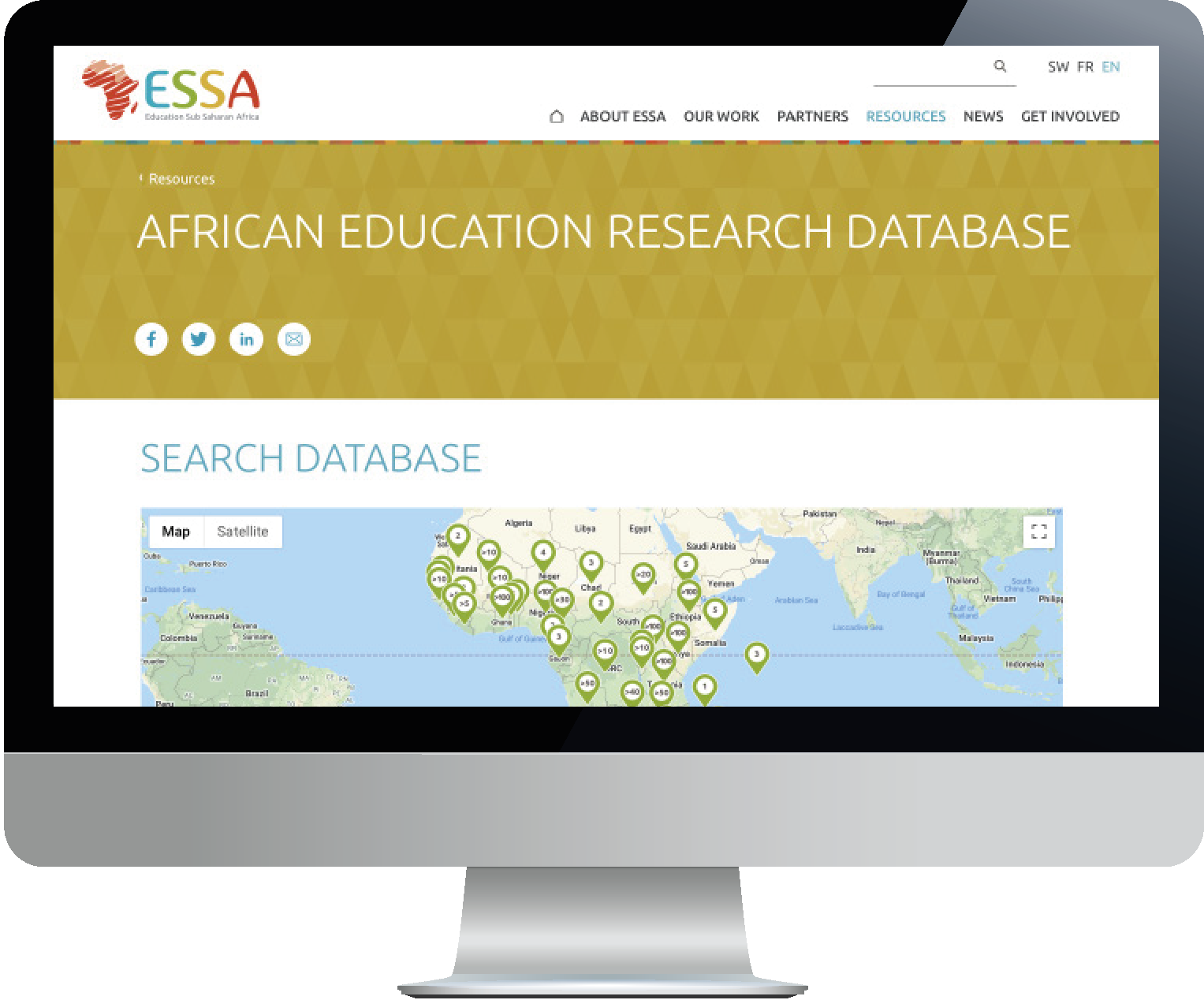
The African Education Research Database
The database was developed by the Research for Equitable Access and Learning (REAL) Centre, Faculty of Education, University of Cambridge, in partnership with ESSA.
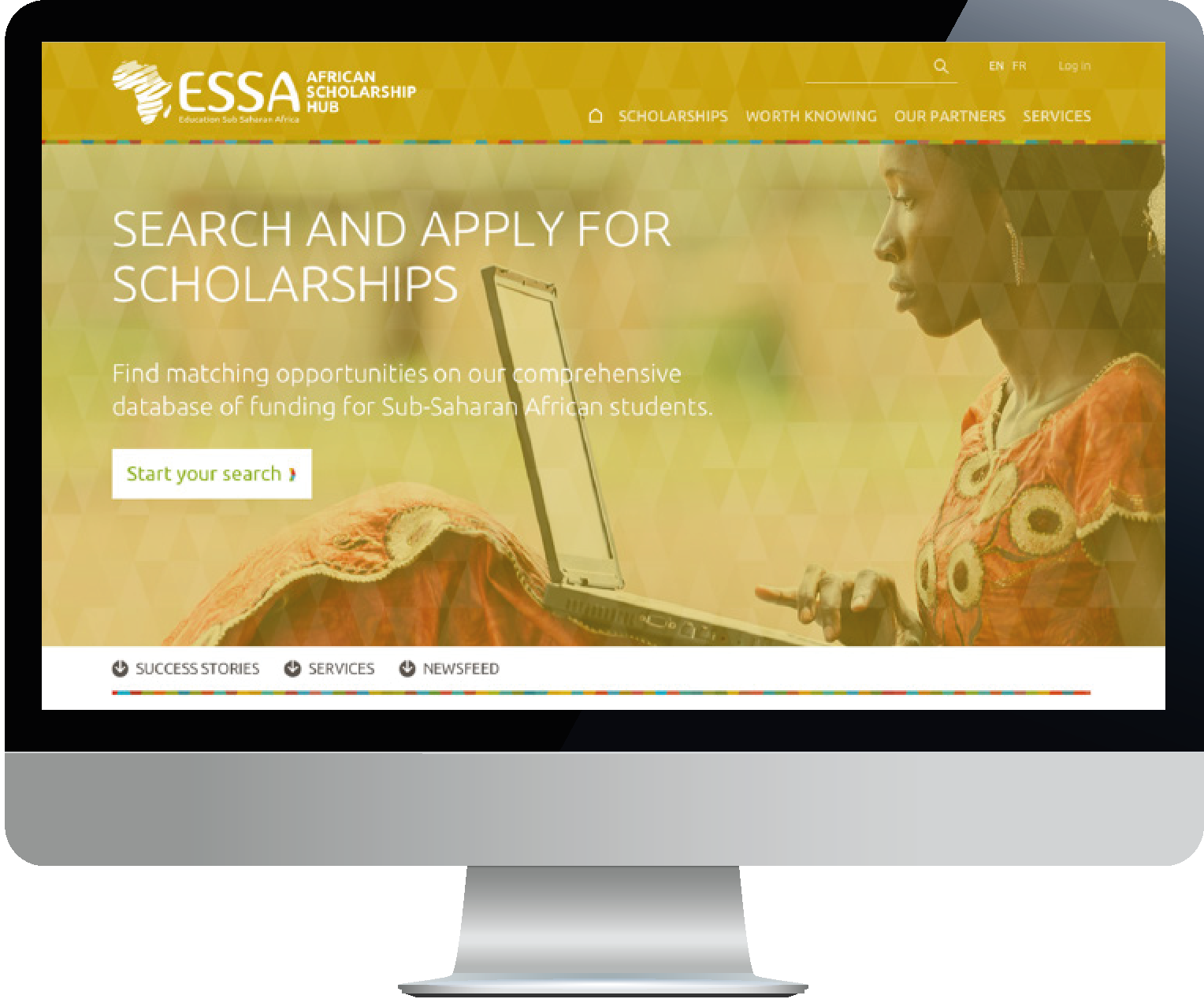
ESSA Sub-Saharan Scholarship Hub
Our online database matching students in sub-Saharan Africa with scholarship opportunities.
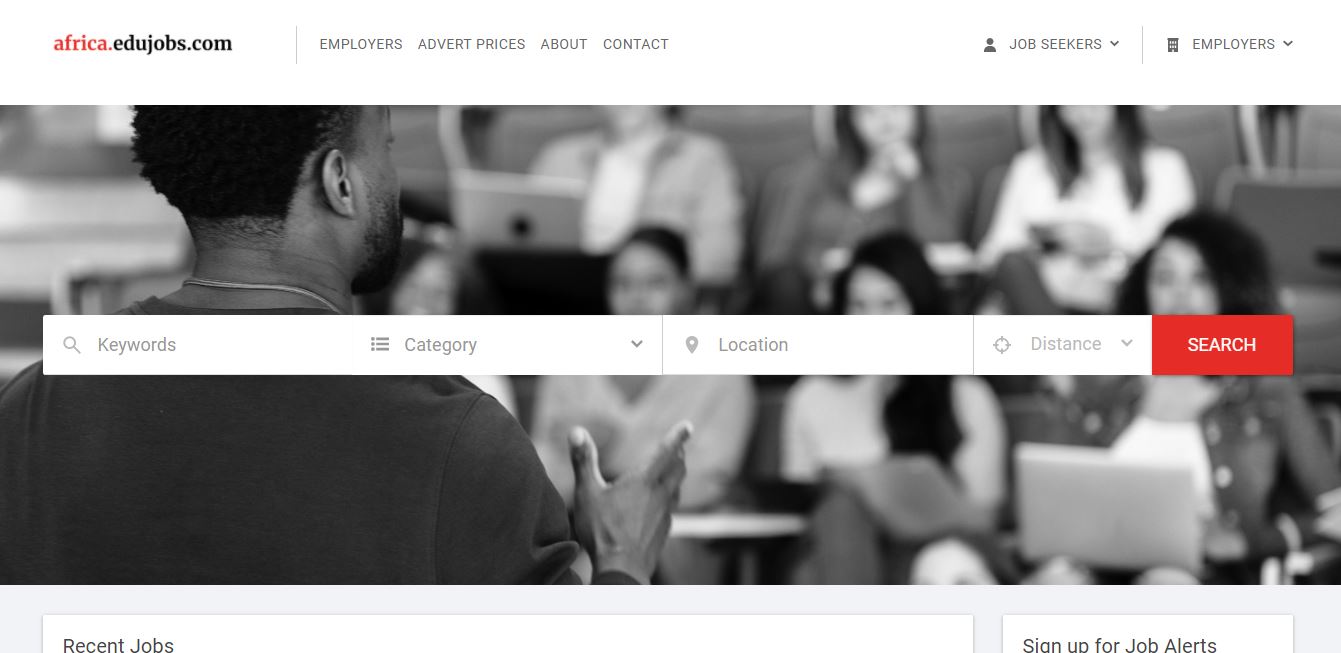
Edujobs Africa
The African Jobs Board was created by the Association of African Universities (AAU), the Warwick Employment Group (WEG) in partnership with ESSA.
The jobs site promotes opportunities between universities, colleges and other education institutions across the sub-Saharan region, and helps job seekers find new opportunities in education.
Milestones in our 5-year journey
-
ESSA's growth from 2016 - 2021
2016 -
-
ESSA was inspired by the impact of systemic challenges on the ground that our founder Patrick Dunne saw through his work with Warwick in Africa
-
Patrick Dunne and Chris Foy appointed first trustees
-
Start-up investment from the Robert Bosch Foundation
-
Olaf Hahn appointed Director Uta-Micaela Dürig CEO of Robert Bosch Stiftung becomes a trustee
2017 –
-
Joel Kibazo joins the ESSA Board of Trustees
-
Established partnerships with the African Association of Universities (AAU), Ghana’s National Council for Tertiary Education (NCTE),
the Population Reference Bureau (PRB) and Mastercard Foundation to conduct pioneering analysis of demographics of faculty in Ghana
-
Established Partnership with the REAL Centre at the University of Cambridge
2018 –
-
Mmasekgoa Masire Mwamba joins the ESSA Board of Trustees
-
Partnership with The Schaufler Foundation to develop the African Scholarships Hub and map over 5,000 scholarships from over 300 providers
-
Piloted the ‘demographics of faculty’ study to provide fresh insights on the scale of the faculty crisis in Ghana in partnership with AAU, NCTE and PRB, supported by the Mastercard Foundation.
-
Launched the first free African Education Research Database in partnership with the REAL Centre and with the support of the Jacobs Foundation, with over 2,500 research papers by African scholars
2019 -
-
Dubai Cares partnership and investment to transform education in sub-Saharan Africa
-
Joachim Rogall joins ESSA Board of Trustees, Uta Micaela During and Mmasekgoa Masire Mwamba become first ESSA Patrons
-
Created a framework for scholarship programmes, endorsed by UNESCO, to ensure they have impact for young people and society
2020 –
-
Lucy Heady appointed as ESSA CEO
-
HE Tariq Al-Gurg appointed as ESSA Patron
-
Dolika Banda, Nancy Matimu and Kendi Mtwiga appointed ESSA Trustees
-
ESSA’s work on scholarships is published the Global Education Monitoring ReportLucy Heady appointed as ESSA CEO
-
Launched Edujobs Africa, the first African Academic Jobs board with over 400 jobs in partnership with AAU and the Warwick Employment Group
-
Published an evidence synthesis on the impact of COVID-19 on universities and colleges, drawing out lessons for policy- makers, vice-chancellors, faculty and students
-
Launched the African Scholarships Hub
2021 -
-
Research to understand the student journey in Sub-Saharan Africa with Quilt.Ai and IPSOS
-
Scaling up our work on the faculty crisis to East Africa in partnership with the Inter-University Council of East Africa, AAU and PRB
-
Worked with UNHCR to map education opportunities for refugees in 21 countries in West and Central Africa
-
Launched our strategy for the next 5 years
-
Learning in Crisis
-
Our COVID-19 Response
How we responded as a team
Back in March 2020 when the global pandemic hit, the ESSA team was already working remotely. We adapted quickly, putting in place measures that ensured the safety of our employees and stakeholders. This enabled us to maintain our support to those at the forefront of education in sub-Saharan Africa.
Adapting did not come without challenges. Most notably the strain placed on many of our partners and the tertiary education sector in sub-Saharan Africa.
Despite these challenges, our partners and those we work with – including students, educators and policy leaders – came together to protect education as a fundamental right for all during this crisis.
How the education sector responded: learning in crisis report
The COVID-19 pandemic has challenged universities and colleges in sub-Saharan Africa in many new and unexpected ways. It is becoming increasingly clear that COVID-19 will be a fixture in our lives for some time to come.
Our Learning in Crisis report addressed some of these challenges and learnings from the pandemic response for the tertiary education sector.
Fionah Umulisa, former ESSA intern and Africa Leadership University graduate, Rwanda:
“Students are being left behind with e-learning, for example the Ministry of Education have put resources on their website, on the radio, and on television, but many students don’t have electricity or can’t afford data. Teachers and students with internet access also need training to use these e-learning platforms.”
We identified top lessons for college and university students, faculty, and Vice Chancellors in sub-Saharan Africa. Infographics needed with top lessons for:
Through promoting the report on our social media platforms, we gained over 9,000 views. Through sharing the report directly with our partners and their member organizations, we reached over 5,000 education stakeholders.
The results of our report aim to improve education policymakers’ and researchers understanding of the current challenges. Most importantly, it will serve as an important tool for recovery strategies for students, vice chancellors and faculty members during and after the pandemic.
Our work from evidence to action
-
Access to university and college
Scholarships Impact
We are supporting more young people to attend university or college and complete their course. We are maximising the return on investment of scholarships, loans and grants by building the evidence base and working with funders.
-
Identify issue: Young people are concerned about the high cost of education (Quilt.AI 2021). As demand for education surges in the world’s youngest continent, there is limited evidence to know whether scholarships are helping young people to join the workforce and little tracking of the funding return on investment.
-
Building an Evidence Alliance: Bringing together students, universities, and influential scholarship funders and providers. Scholarship funders and providers see the potential for collaboration and agree on the core challenges to achieving impact for young people.
-
Understand evidence: Pioneered analysis into over 400 top scholarship programmes for students in sub-Saharan Africa. Uncovered low return on $750 million annual investment, limited access for disadvantaged students, high drop-out rates, limited support for students to find jobs, lack of tracking about impact of scholarships on society.
-
Solution: Analysis featured in UNESCO’s 2020 Global Education Monitoring (GEM) report. Using this knowledge, we created the ‘African Scholarships Hub’ to help young people find scholarships more easily online. Created a mini report on the inclusion of young people living with a disability in Technical and Vocational Education Training (TVET).
-
Solution at scale: Created publicly available KPI framework for social inclusion within scholarship programming, providing guidance to providers and funders. Expanding digital hub to thousands of scholarships. Partnership established with UNHCR to map pathways into education for refugees in West and Central Africa.
“The in-depth analysis of scholarship opportunities for sub-Saharan African students, contributed by ESSA to our Report, filled a void in research that needed to be filled. Charged with a mandate to monitor the fourth Sustainable Development Goal, SDG 4, but with no systematic data on the number of scholarships mentioned in Target 4.b, this analysis was a critical piece for us. It successfully reinforced the message that scholarships must prioritize an inclusive focus if they are to be equitable.”
- Global Education Monitoring Report, UNESCO
-
-
Quality of university and college education
The Faculty Crisis
Africa is facing a shortage of academic teaching and research staff. At the same time, more young people are enrolling in university or college across the region. COVID-19 is making delivering quality education even more difficult. To address this, we are connecting evidence on delivering quality education with university and college leaders, and policymakers.
-
Identify issue: Critical shortage of academic teaching and research staff.
-
Building an Evidence Alliance: Created a consortium – made up of the Association of African Universities (AAU), Education Sub Saharan Africa (ESSA), and the Population Reference Bureau (PRB) – in partnership with the Ghana National Council of Tertiary Education (NCTE), now the Ghana Tertiary Education Commission (GTEC), commissioned a study called the Demographics of Faculty to understand the quantity and quality of faculty members and policy environment of universities in Ghana.
-
Understand evidence: The study revealed that Ghana is facing a critical shortage of academic teaching staff. To achieve the desired student-teacher ratios, public universities in Ghana are required to hire an additional 3,410 faculty staff of which 71% would need to be women. Gender inequality persists across faculties within disciplines and academic ranks. In the 2016/2017 academic year, only 10 out of 120 faculty staff with the rank of professor at public universities were women. In 2019 we led research on the impact of COVID-19 on university and college education in sub-Saharan Africa (as seen on page X).
-
Solution: Updating the GTEC university and polytechnic policy norms. Creating digital tools to improve data collection and faculty planning across Ghana.
-
Launched first academic African jobs board ‘Edujobs’ to help faculty and education job seekers find jobs and employers in the education sector find talent, in partnership with University of Warwick and the Association of African Universities.
-
Solution at scale: Continue to work with partners, and the Inter-University Council of East Africa, expanding work to 6 countries in East Africa. Establishing a methodology for developing an online planning tool that can be replicated and used to improve faculty planning and decision-making in other African countries.
“The ESSA's study found that Ghana needs five times more faculty to meet growing numbers of students. The results were timely and revealing. It made those of us in academia and policy making rethink the approach to solving the faculty deficit challenge. The local/ national capacity for producing doctoral graduates in universities in Ghana is inadequate. The practices and competencies of focus for faculty also need to be enhanced to include teaching and learning skills, research skills, grant management skills and other soft skills, which are not currently part of the requirement for becoming an academic in Ghana.
Taking part in ESSA's workshop on the faculty crisis revealed to me in a most practical way, the skills and competences that effective academics should possess and the opportunities to develop more faculty with global perspectives in an international academic environment. Thanks to ESSA for that revealing initiative. I hope to see the impact of the study and workshop positively affecting faculty development in Ghana.”
- Prof. Goski Alabi, Co-founder of Laweh University College in Accra, Ghana, and participant in our Demographics of Faculty study.
“There is the need to reduce the gap that exists between the student-teacher ratio. We need more faculty staff and academics to ensure that the teaching is effective and the learning processes are efficient within the university communities.
It is important for teaching and students, it is important for research, it is also important for community service because if there is a deficit, usually African researchers come out with poor teaching strategies, poor research outputs, and they may have limited time for community services because they are overly burdened.”
- Fred Awaah, Lecturer at the University of Professional Studies, Accra, Ghana
Women Leading
Women must have more leadership opportunities and roles to improve society for us all. Whilst this is not unique to education, academia can set the bar. We have an opportunity to unlock the potential of female leadership.
Universities and colleges are places where women can gain leadership skills and roles:
-
Female role models in universities and colleges can inspire new generations of young people to be leaders.
-
Mentoring and networks within universities and colleges and beyond can unlock the power of female leadership.
-
Scholarships can develop students and educators into leaders.
This counteracts unconscious gender biases: transforming society so that it works better for everyone.
-
Identify issue: underrepresentation of women in leadership positions within universities and colleges (and beyond). Only 8% of professors at public universities in Ghana are women (ESSA DAF study). Across sub-Saharan Africa just 2.5% of vice-chancellors are women. More evidence is needed on the role of universities and colleges in equipping women for accessing leadership opportunities and positions in sub-Saharan Africa.
-
Building an Evidence Alliance: Bringing together universities, colleges, employers, and leadership organisations. Promoting female education leaders' stories.
-
Understand evidence: Analyzing female leadership policies and practices within universities and colleges. Led a survey and interviews to discover the barriers female students, faculty and graduates in sub-Saharan Africa face accessing leadership skills and roles.
-
Solution: Released a report on the State of Female Leadership in Education in Sub-Saharan Africa.
-
Solution at scale: Scoping solutions for policies and improved leadership programmes.
“At some point, society, family, circles pull you down and you don’t know how to get up. Where I think ESSA can come in is to really integrate leadership as part of education."
Almaz Negash, Founder of the African Diaspora Network.
-
-
Transition to work
Universities increasing work skills for young people
We are joining up employers with universities and colleges to work on evidence-based approaches to help young people transition into jobs.
-
Identify issue: In Ghana, it takes more than ten years for most graduates to secure decent jobs after leaving school. (ISSER of the University of Ghana, 2017). In Uganda 79.5% of employed young people are undereducated for the job they are doing (ILO SWTS, 2014). There is a miss-match between what students are learning in university and the skills employers need. This is underpinned by a lack of data and evidence about what students do once they leave university or college.
-
Building an Evidence Alliance: Joining up employers, universities and colleges across region. Established a partnership with The Education Collaborative at Ashesi University in Ghana. Engaging employers with universities and colleges e.g The University of Cape Coast, Ghana (UCC).
-
Understand evidence: Identified the barriers for increasing employability and closing the skills gap for young people between university/college and employment. Created mini-report on how universities in Africa can build job skills for young people.
-
Solution: Using evidence to develop a framework for effective career services in universities/colleges and tracking young people’s employment.
-
Solution at scale: Testing the framework with UCC and co-creating activities to share learning with other universities and colleges.
-
-
Knowledge eco-system
The African Education Research Database
We contribute to a sustainable knowledge ecosystem for education by raising the profile of African education researchers and increasing access to relevant data.
-
Identify issue: There is a wealth of research on education by researchers in sub-Saharan Africa. But this research is often not sufficiently used nationally, regionally or globally to solve challenges in education.
-
Building an Evidence Alliance: We partnered with African researchers and the Research for Equitable Access and Learning (REAL) Centre at the University of Cambridge.
-
Understand evidence: Together we created the first free online database of education research by scholars in Africa, with over 3500 papers in English, French and Portuguese. African Education Research Database(AERD)
-
Solution: Gaps in research and the need for a research community were identified. Curating research from AERD, promoting improved education, including a report on access to TVET for people with disability.
-
Solution at scale: Supporting a network of researchers to inspire policy change in tertiary education in the region. Curating research from this database to promote better education policies, making it more accessible to policy/decision-makers for tertiary education in Africa. The database highlights gaps in education research. This is particularly crucial for under-researched areas identified in the database (such as education in conflict and TVET).
"Often the claim is that education is under-researched in Africa and there is not enough information available. While this in not completely untrue, the reality is that there is a lot of research and information out there that only needs to be unearthed and made visible.
This is where the database comes in and so far, has done a very good job at increasing visibility of education research and scholars in Africa. The platform also has an impactful role in our daily work, as we are always looking for education research to learn form and improve our work."
- Maud Seghers, Senior Education Advisor at VVOB
Unlocking Education Data
We are mapping available data sets across education covering early childhood education, primary and secondary and into tertiary. We have started to build a community of practice to increase the access and use of this data.
-
Identify issue: Data about post-secondary education is hard to find and use. It is difficult for decision-makers – from governments to university leaders, and researchers – to access and find the data they need to improve education delivery and policy.
-
Building an Evidence Alliance: We are working in partnership with Zizi Afrique and the EdTech Hub to create a community of researchers and organisations who gather education data. This community will map existing education data and find out where there are gaps, and influence those who own data to share it widely.
-
Understand evidence: The data community has begun mapping available education data in Kenya. We are bringing in evidence from our African Education Research database and connecting with African scholars across the continent who need data for their work.
-
Solution: Replicate data mapping in Ghana and other countries in sub-Saharan Africa. Develop online and offline tools for the community of practice to share data and learn from each other.
-
Solution at scale: Holding a series of workshops with researchers and policy makers to find out what data they need and why.
“The biggest gap is the use of evidence to connect trainers and employers to transform the way young people in sub-Saharan Africa access employment opportunities post-training.”
- John Mugo, Executive Director, Zizi Afrique Foundation
Listening to students
Applying to colleges and for jobs is a daunting process for students. From gathering information to navigating long forms - students seek close guidance and support. The internet has opened up a world of possibilities and support for students, especially those looking to go abroad for university, college, or work.
As of 2017, there are 9 million post-secondary students in sub-Saharan Africa. As educational attainment grows, so too will the qualified numbers of young people in Africa seeking a university or college education abroad and at home.
We worked with Quilt.AI to understand students’ journeys online in Ghana, Kenya, Zambia and Uganda. We wanted to answer the following questions - what are the enablers and barriers to post-secondary education, scholarships, and job applications? What are students saying about these areas?
Up to 300,000 unique searches by students on social media were analysed across the four countries. We also looked at 2,000 social media posts from Facebook, Twitter and Instagram to understand how students are getting information about university and jobs and what conversations they are having.
The pandemic has affected students’ lives, from attending college to finding jobs in struggling economies. As they navigate future uncertainties, organizations, like ESSA, play a critical role in helping them navigate opportunities. The internet is a powerful platform to reach students as they use it to find information and resources. Using digital insights and marketing tools can amplify organisations’ messages and reach more students.
-
Transformational impact through partnerships
-
Transformational impact through partnerships
Partnerships have always been essential to ESSA’s success. We seek to work with partners across the African continent on all our projects. Our small team magnifies impact through those we work with. ESSA is one part of the ecosystem of individuals and institutions seeking to transform tertiary education in sub-Saharan Africa and our greatest successes have come from brokering partnerships within this ecosystem to deliver change.
How we do it:
-
Identifying organisations with the right expertise in Africa and beyond.
-
Bringing new ideas and using our experience of delivering practical and relevant research, to bring these organisations together to form networks and communities.
-
Working with these networks and communities to understand what data and evidence is needed for change, and to build robust and credible knowledge.
-
Working together to use knowledge to create practical solutions. Building influence within specific communities.
-
Achieving a mandate to drive change at scale from memberships or electorates. Networks and communities implement solutions at scale.
-
Developing an evidence alliance for education that delivers impact for young people in sub-Saharan Africa.
Spotlight on: Association of African Universities & Warwick Employment Agency
The Association of African Universities (AAU) is a longstanding leader in African tertiary education. Its mission is to enhance the quality and relevance of university and college education in Africa and strengthen its contribution to Africa’s development.
Warwick Employment Group (WEG) provides worldwide employment opportunities for students, institutions and their staff, to maximise their potential in the workplace. The organisation is developed through a quality, ethical, community approach, mirroring the aspirations of our university partners, to fulfill a recruitment need for the higher education sector.
In partnership with the Association of African Universities (AAU) and the Warwick Employment Group (WEG); part of the University of Warwick, we launched Edujobs Africa, the first academic jobs board for the continent. Edujobs Africa is an online website, hosting job vacancies in tertiary education in Africa; this includes academic and staff roles at universities, colleges, and other education organsiations across Africa. The site will support universities, colleges and governments in the region to retain academic talent within Africa, promote mobility between educational institutions across Africa and help job seekers in Africa to find new opportunities in education.
Edujobs Africa offers the opportunity for universities, colleges, and other education institutions to promote their work and vacancies to a broad audience.
-
FUTURE Ahead
Our goal for 2026
University and college leaders, employers, policymakers and young people are using evidence together to:
-
Increase access to universities and colleges, through impactful scholarships and loans.
-
Develop business models that make sure universities and colleges have enough faculty to develop young people’s skills for work.
-
Match graduate's skills and ambitions with work opportunities.
-
Ensure women, refugees, young people with disabilities, and others who are underrepresented, play a leading role in universities and colleges.
This will support more than 1.4 million current students at over 500 universities and colleges in Ghana, Kenya, Uganda and Zambia to achieve their ambitions, and create more opportunity for the millions that will follow.
We are making this happen by building an alliance for evidence-based education in sub-Saharan Africa:
-
Starting work on an ambitious five-year strategy designed to support a data and evidence-led transformation of tertiary education in sub-Saharan Africa.
-
Collaborating with partners and funders to maximise the impact of their strategies and investments into education.
-
Delivering on impact by moving from interesting and provocative analysis to real change for the sector.
-
Building our role as a thought leader.
-
Catalysing new, intelligent investment into tertiary education.
-
Increasing our country presence by setting up a legal entity in Ghana.
-
Strengthening staff expertise and leadership.
If you would like to help us with this, please get in touch.
How we aim to reach this goal through our focus areas
-
Access to university and college education
Impact of scholarships in the next year:
-
Research conducted to understand the growing need for student finance, the funding and different models available, their cost-effectiveness, and impact. Evidence is provided to decision-makers.
-
Expand mapping to TVET opportunities and other forms of student finance, including grants and loans, in our focus countries.
-
Engage with corporate sponsors of scholarships.
-
Understand the barriers to access to education for refugees through our work with UNHCR, and women through our Women Leading work, ,and the role that student finance can play in improving their access to education.
In the next five years, by 2026:
-
A core group scholarship funders and providers have signed up to common KPIs to drive improved return on investment and impact for young people.
-
Our African Scholarships Hub is reaching students across sub-Saharan Africa, including those from under-represented groups, and helping them find the right scholarships for them.
-
There is a community of interest for student finance that shares good practice and data on results, and advocates for further investment.
-
Providers of student finance design their programmes to be inclusive of women, refugees and other under-represented groups.
-
Young people in our focus countries have the data and evidence to seek the financial aid that is right for them.
-
Policy-makers in our focus countries have the data and evidence to design and implement effective financial packages.
-
Investors have the data and evidence to invest in approaches that achieve the most impact, particularly for the young people in our focus countries.
-
-
Quality of university and college education
The faculty crisis, in the next year:
-
Our analysis of the faculty crisis in East Africa is underway, incorporating the impact of COVID-19.
-
There is a deeper understanding of the impact of the faculty crisis on quality university and college education in our focus countries.
-
Current solutions to the faculty crisis in our focus countries and the evidence for their impact are well understood.
-
Policy-makers and leaders of universities and colleges in Ghana have the tools to quantify the scale of the faculty crisis they are facing.
-
Edujobs Africa, a pan-African jobs board, is successfully improving the speed and quality of faculty recruitment.
In the next five years, by 2026:
-
New models for universities and colleges are mapped with a focus on 1) models targeted explicitly at employment and 2) models with a large component of online learning.
-
Analysis of the faculty crisis is expanded to cover TVET institutions.
-
Assessment of the faculty crisis becomes standard across SSA.
-
Data on the faculty crisis are readily available.
-
Policy-makers in our focus countries have effective strategies in place to address the faculty crisis.
-
The potential for new models of tertiary education to deliver quality at scale are well understood.
-
The faculty crisis and potential solutions are well understood across Ghana, East Africa and other regions.
Women Leading, in the next year:
-
There is uptake of our Women Leading report findings by organisations in our network.
-
There is a coalition for action to overcome the barriers female leaders face within universities and colleges.
-
Establish and mobilise strong partnerships in one (or more) focus countries to deliver impact.
In the next five years, by 2026:
-
The effectiveness of scholarships, mentorship, network, training and policies to increase female leadership is understood in our four focus countries.
-
New models for increasing female leadership skills and positions universities and colleges are mapped in our focus countries.
-
Policy makers, employers and educators are making use of data to determine what measures must be taken, what targets must be put in place, and what policies are needed to improve the numbers of women in leadership positions.
-
There are specific leadership development programmes and policies aimed at building the leadership capacities of women.
-
-
Transition to work
Increasing work skills, in the next year:
-
In Ghana there is a deeper understanding of the barriers for employers engaging with universities and colleges.
-
Evidence for what is effective within universities and colleges for improving transition to employment in our focus countries is mapped and translated into guidance (including internships, apprenticeships and alumni networks).
-
The characteristics of effective careers development systems and measurement frameworks are well understood.
-
Barriers and solutions for women and other under-represented groups transitioning into employment and leadership positions are well understood.
In the next 5 years, by 2026:
-
Universities, colleges and employers are effectively collaborating to improve employment prospects in our focus countries.
-
Tracking of students into work is widespread in our focus countries and data is openly available.
-
Universities, colleges and employers in our focus countries are implementing 'best practices' for supporting women and other under-represented groups and tracking their success.
-
Young people and their parents in our focus countries can use data (e.g. on employment after graduation) to make choices about what they study.
-
-
Knowledge eco-system
African-led research and unlocking data in the next year:
-
We continue to support researchers in Africa to be better networked, access more contracts for their work, and influence local policy.
-
We are hosting a virtual conference in 2021 in collaboration with the REAL Centre at the University of Cambridge, to bring together researchers from across Africa to discuss challenges they face related to research funding and opportunities.
-
Data and evidence on education in sub-Saharan Africa is more easily available for research and analysis and there is greater awareness of what exists, particularly policy-makers in our focus countries.
In the next five years, by 2026:
-
African researchers influence local policy in our focus countries.
-
Policy-makers and educators have access to relevant data on university and college education and the transition to employment for young people in our focus countries.
-
An overview of available data and evidence allows for smart investment in data collection and evaluation in our focus countries.
-
Relevant data and evidence are easy to find and are translated into practical guidance for educators, policy-makers and students in our focus countries.
-
The local ecosystem of data-collectors, academics, consultants and civil society has the access to the right data, evidence and skills to influence key decision-makers in our focus countries.
-
“Often the claim is that education is under-researched in Africa and there is not enough information available. While this in not completely untrue, the reality is that there is a lot of research and information out there that only needs to be unearthed and made visible.
This is where the database comes in and so far, has done a very good job at increasing visibility of education research and scholars in Africa. The platform also has an impactful role in our daily work, as we are always looking for education research to learn form and improve our work."
Maud Seghers, Senior Education Advisor at VVOB
Faculty Shortages and Support in Africa
Fred Awaah is a lecturer at the University of Professional Studies in Accra, Ghana.
THANK YOU
We would like to thank our partners, funders and private donors for their continued support.
